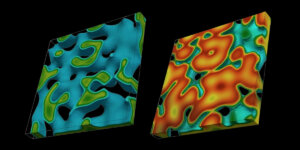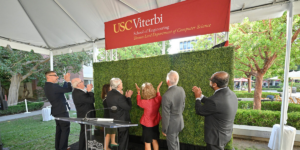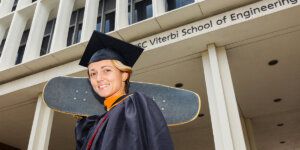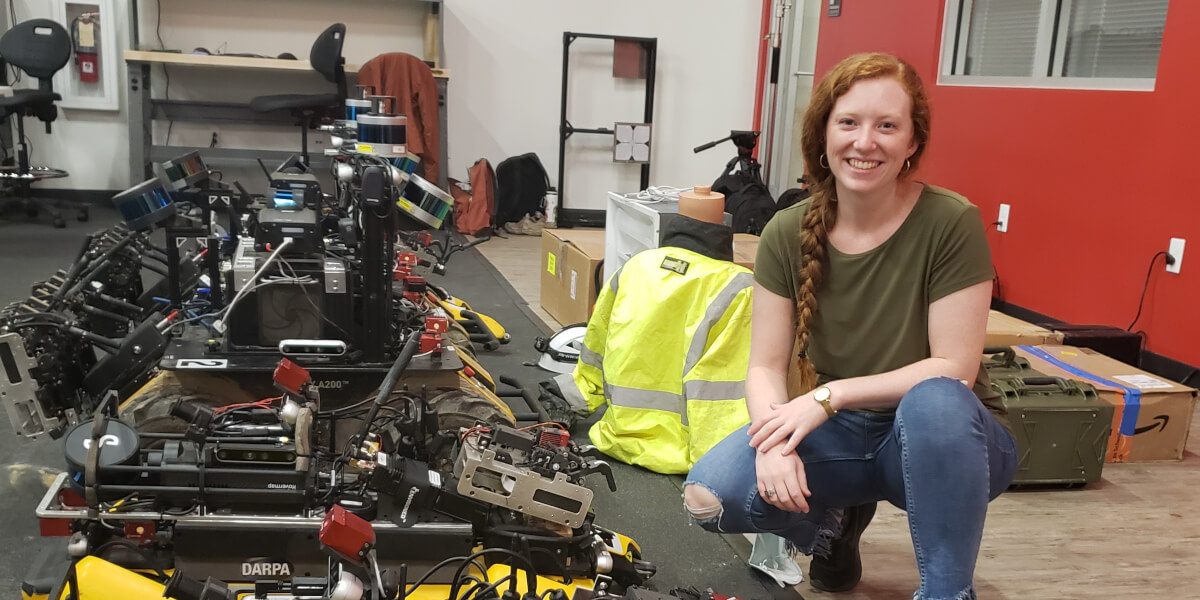
Fly me to the moon? Lillian Clark pursued jazz vocal studies alongside her research in lunar robotics.
During her tenure as a doctoral student in the Ming Hsieh Department of Electrical and Computer Engineering (ECE), Lillian Clark spent a good deal of time tinkering with robots in Professor Bhaskar Krishnamachari’s Autonomous Networks Research Group.
The focus of her dissertation, which has been nominated for the William F. Ballhaus Jr., Prize for Excellence in Graduate Engineering Research, is the design and implementation of complex algorithms for multi-robot systems.
“My research is on how teams of robots can collaborate and communicate to better explore remote environments where it’s not safe or practical to send humans, like the lunar subsurface,” said Clark, who in April began working as a software engineer at SpaceX’s Starlink.
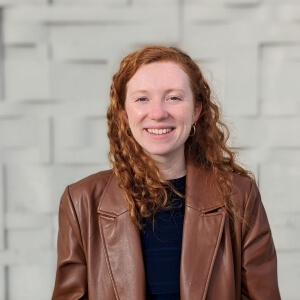
Lillian Clark is a jazz musician and newly minted PhD in Electrical and Computer Engineering.
She credits Krishnamachari as well as Professor Konstantinos Psounis for guiding the development of her research interests and critical thinking skills. “They are both excellent and compassionate advisors and mentors as well as sharp and insightful teachers,” said Clark.
Yet Clark’s research acuity has also been influenced by a surprising source: her passion for jazz.
Stepping up to the mic
A longtime jazz saxophonist, Clark became interested in jazz vocal performance during her time at USC. She decided to enroll in a class at USC’s Thornton School of Music with Sara Gazarek, an adjunct instructor of jazz studies and Grammy Award-nominated singer.
“I’ve had many music teachers and mentors who emphasized ear training and gave me a deep respect for the voice as an instrument,” said Clark of her motivation for taking the class. “Mostly I thought the class would be fun!”
Clark was grateful that Gazarek let her enroll despite her lack of singing experience. She was also glad that her Ph.D. advisors were supportive of the endeavor.
Exploring the art of jazz singing ended up helping Clark do some of her best collaborative work in her research lab.
“I think the most important thing I learned from studying jazz is improvisation, specifically how to think on your feet, how to listen and react to other people, and how to be confident even though no amount of preparation guarantees anything will go exactly how you expect,” she said. “I think these skills have made me a better collaborator and communicator, and therefore a better researcher.”
A well-rounded education
Clark’s detour into jazz isn’t the only example of how she pursued eclectic interests outside the lab. She also organized monthly seminars for the USC Ph.D. Women and Gender Minorities in Computing Club (WinCC) and mentored peers through the Women in Science and Engineering (WiSE) program.
“Both of these clubs were a really nice way to meet and get to know fellow grad students,” said Clark.
As a Ming Hsieh Institute Scholar, she served as an ambassador for the ECE Department, affording her the chance to meet visiting faculty candidates and visiting prospective students.
“It was a fun way to get exposed to research from other universities and an opportunity to pass on wisdom from being in the department for many years,” she said.
Clark appreciated that USC Viterbi provided so many avenues to improve her ability to network and communicate — just as she was figuring out how to make her robots do the same.
“One thing that’s special about the Viterbi community is that people work very hard but don’t seem to take themselves too seriously,” said Clark. “I think the community has a lot of respect for a well-rounded and balanced life.”
As Clark dives into her new role at Starlink, jazz continues to provide balance to her engineering pursuits. She’s working to augment the coordination of low Earth orbit satellites … and listening to a lot of music by jazz singer Samara Joy.
It’s no surprise that she sings along.
Published on May 10th, 2023
Last updated on May 16th, 2024





